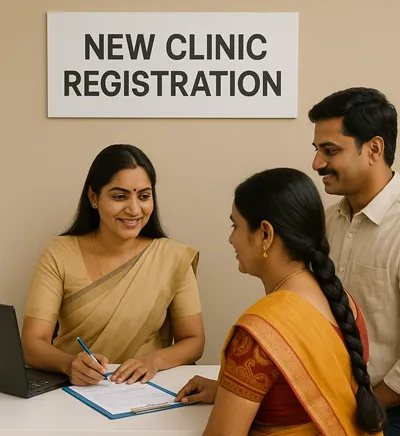
The Clinical Establishments (Registration and Regulation) Act, 2010 is a central law in India that ensures hospitals, clinics, laboratories, and other health facilities follow minimum standards of infrastructure, hygiene, and service quality. All clinical establishments—government or private—must register under this law, except those run by the armed forces.
The Act aims to improve patient safety, ensure transparency, and create a national registry of clinical establishments. State and local authorities monitor compliance.
Key Highlights
- Who is Covered: Hospitals, clinics, diagnostic labs, dental clinics, and even Ayurvedic, Unani, Siddha, and homeopathy centres.
- Mandatory Registration: All facilities must be registered; unregistered clinics may face penalties or closure.
- Minimum Standards: Clean premises, trained staff, proper equipment, and safe treatment protocols.
- Patient Safety & Accountability: Patients can complain to local authorities if care is substandard.
- National Registry: Helps track and standardize quality of healthcare across India.
FAQs – Clinical Establishments (Registration and Regulation) Act, 2010
-
What is the Clinical Establishments Act?
-
It mandates registration of hospitals, clinics, laboratories, and other health centres with minimum standards for infrastructure, staff, and patient safety.
-
What counts as a clinical establishment?
-
Hospitals, private clinics, diagnostic labs, dental centres, and Ayurvedic, Unani, Siddha, or homeopathy clinics.
-
Why must a clinic register?
-
To ensure clean premises, trained staff, proper equipment, safe treatment, and accountability.
-
Who must register?
-
All government and private providers, including single-doctor clinics; armed forces establishments are exempt.
-
How do I verify if my clinic is registered?
-
The clinic should display its registration certificate. Verification is also possible via the state or district health department portal.
-
What are the benefits of registration?
-
Standardized treatment, accountability, legal support for complaints , and improved patient trust.
-
Can patients complain about poor treatment?
-
Yes, to the District Registering Authority or local health officials; they will inspect and take action.
-
Does the Act prevent fake clinics?
-
Yes, unregistered or non-compliant clinics can be penalized, sealed, or closed.
-
Does the law cover all types of treatment?
-
Yes, it includes allopathic as well as traditional systems (Ayurveda, Unani, Siddha, Homoeopathy).
-
Do small or home-based clinics need to register?
-
Yes, even small setups must comply with minimum standards.
-
Does this law fix hospital fees?
-
No, it does not fix fees but encourages transparency; clinics must clearly inform patients about charges and services.
-
What happens if a clinic is not registered?
-
Operating without registration is illegal and may result in penalties, legal action, or closure.
-
What are "minimum standards"?
-
Clean premises, trained staff, proper equipment, safe waste disposal, and standard treatment protocols.
-
Who implements this law?
-
State governments, with District Registering Authorities responsible for registration, monitoring, and compliance.
-
How does this law improve healthcare in India?
-
By defining quality, safety, and accountability, it ensures all clinics and hospitals provide reliable and safe care for patients.
Add new comment